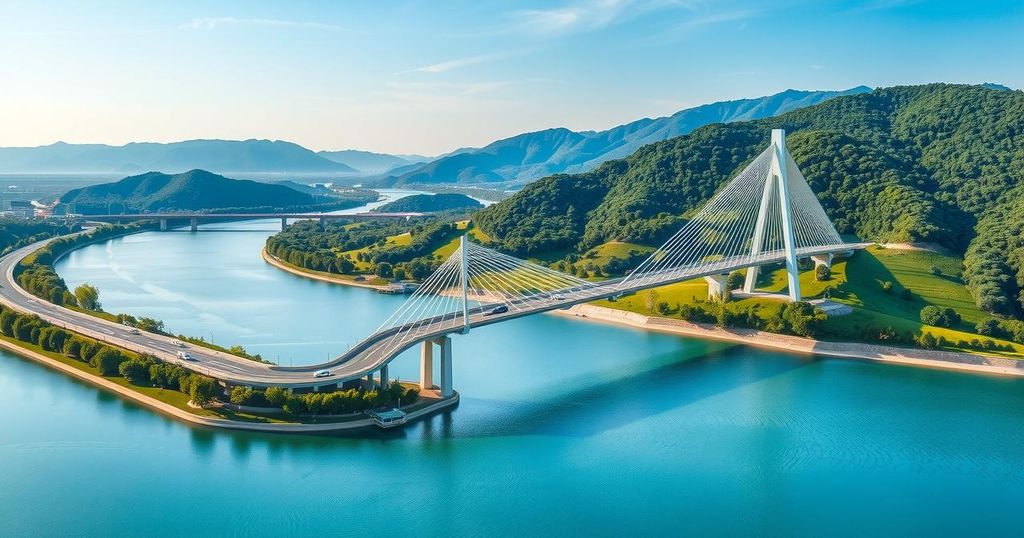North Korea and Russia Begin Construction of Strategic Bridge to Enhance Relations

North Korea and Russia have begun building their first road link, a bridge over the Tumen River, expected to accommodate 2,850 people and nearly 300 vehicles daily. This initiative aims to strengthen bilateral relations, amid North Korea’s support for Russia in the Ukraine conflict. The construction follows a June 2024 defense pact and will take about 1.5 years to complete.
North Korea and Russia are currently constructing their first-ever road link, a move that is anticipated to bolster diplomatic relations between the two nations. This new bridge will facilitate daily passage for about 2,850 individuals and nearly 300 vehicles, marking a significant development in their collaboration amid ongoing geopolitical tensions. Notably, this alliance coincides with North Korea’s support of Moscow in the ongoing conflict in Ukraine.
The partnership between North Korea and Russia has been formalized since June 2024, when both countries entered into a defense agreement. Following the signing, Russia has reportedly provided North Korea with essential supplies, including medicine, food, and coal. In exchange, around 12,000 North Korean troops have been dispatched to support Russian forces in Ukraine, underlining the depth of their cooperation.
In June last year, North Korean leader Kim Jong-un and Russian President Vladimir Putin jointly announced plans for a bridge linking their countries via the Tumen River. Construction is expected to take approximately 1.5 years, with the 1-kilometer long bridge expected to greatly enhance cross-border transportation.
According to Russian state news outlet Tass, the accompanying border crossing facility is designed to manage a significant volume of daily traffic, highlighting an increased commitment to fostering economic ties. North Korean media, including the Korean Central News Agency (KCNA), emphasized that this infrastructure is intended to promote tourism and facilitate the movement of goods between the two nations.
“This is a big milestone for Russian-Korean relations,” remarked Russian Prime Minister Mikhail Mishustin during discussions with North Korean counterpart Pak Thae-song. In response, Pak referred to the bridge as a “historic monument” representing the commitment of both leaders to their burgeoning partnership.
Since February 2024, the flow of Russian tourists into North Korea has gradually increased, while tourism from China has sharply declined due to ongoing restrictions. In 2023, 97% of North Korea’s external trade was connected to China, compared to a mere 1.2% with Russia. Currently, there are 17 active road and rail links along the porous North Korean-Chinese border, as reported by South Korea’s Unification Ministry.
In addition to rail links, there is an existing air service connecting North Korea and Russia. The recent agreement to construct a vehicle bridge over the Tumen River signifies the strengthening and diversification of transportation networks between these countries. According to recent intelligence from South Korean and U.S. officials, North Korea reportedly acknowledged its deployment of combat troops to assist in military operations within the Kursk region of Russia, marking a notable admission of participation in the conflict.
Further reports reveal that approximately 15,000 North Korean soldiers have been sent to aid Russian forces, with about 4,700 casualties recorded, according to information from Seoul’s intelligence agencies. This ongoing exchange underscores the strategic and military dimensions of the partnership that continues to evolve.
In summary, the construction of the new road link between North Korea and Russia is set to significantly enhance bilateral relations, enabling increased movement and trade. While military cooperation amid the Ukraine conflict remains significant, the bridge symbolizes a broader commitment to strengthen ties. As both nations navigate shifting geopolitical landscapes, the developments in transportation infrastructure could pave the way for deeper collaboration in various fields.
Original Source: www.the-express.com







